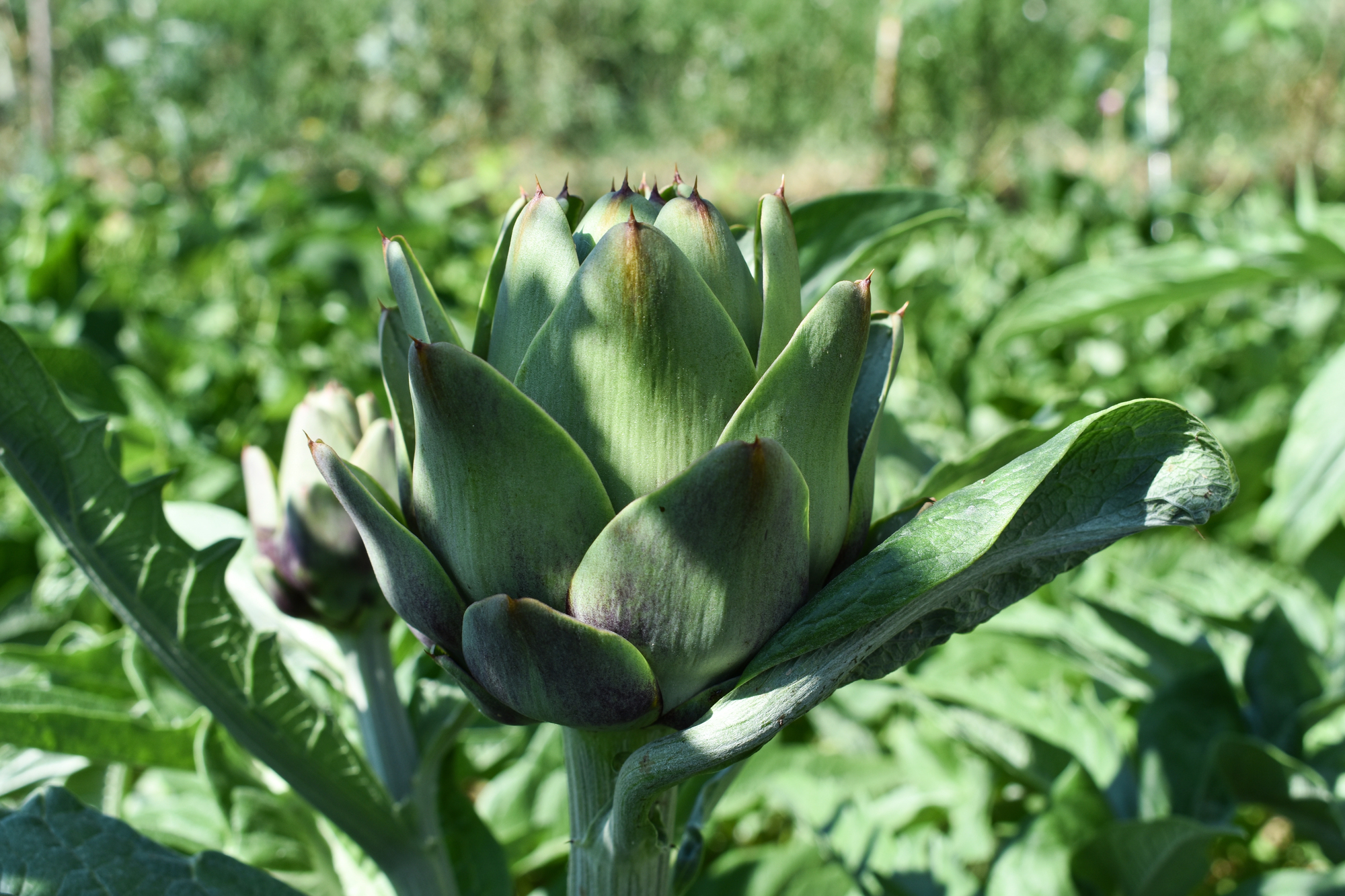“Other” Vegetable Tracker
Quick Links: How & Where to Grow | Temperature | How to Care For | Harvest Signs | Harvesting | Pruning | Pests | Companions | Varieties | Preservation | Recipes | Michigan Tips | Fun Facts
🌱 How & Where to Grow Artichokes:
- Start seeds 12 weeks before last frost – they need a LONG season!
- Vernalization required: Expose seedlings to 50°F for 10-14 days.
- Space plants 3-4 feet apart – they grow huge!
- Transplant after danger of frost passes.
- Sunlight: Full sun (6-8 hours) essential.
- Soil Type: Rich, well-drained soil with pH 6.5-7.0.
- Soil Amendment: Heavy feeder – needs rich, composted soil.
Artichokes are the ultimate gourmet challenge in Michigan – success requires perfect timing and care!
🌡️ Temperature Guidance:
Need vernalization at 50°F. Grow best 60-70°F. Annual in Michigan.
- Vernalization: 250+ hours below 50°F triggers budding.
- Growing temp: Optimal 60-70°F days, 50-60°F nights.
- Heat stress: Above 80°F causes tough, bitter buds.
- Frost sensitivity: Dies at 25°F – grown as annual in Michigan.
- Cool coastal climates ideal – Michigan summers often too hot!
Michigan’s variable climate makes artichokes challenging – treat as ambitious annuals!
💧 How to Care for:
- Consistent Moisture: Critical – 1-2 inches weekly minimum.
- Watering: Deep watering essential for deep roots.
- Mulch: 3-4 inches to keep roots cool and moist.
- Fertilizer: Feed every 2 weeks with balanced fertilizer.
- Wind protection: Stake plants – large leaves catch wind.
📏 Harvest Signs:
Buds 3-4 inches diameter. Tight scales. Harvest before flowering!
- Size: Primary buds 3-4 inches, secondary 1-3 inches.
- Appearance: Tight, compact scales (bracts).
- Timing: Cut while scales still closed tightly.
- Too late: Purple flowers appear if left too long.
- Primary bud develops first, followed by smaller secondary buds.
Don’t wait too long – artichokes go from perfect to flowering quickly!
🧺 Harvesting:
Cut with 2-3 inches stem. Use sharp knife. Harvest before scales open.
- Cut stem at an angle 2-3 inches below bud.
- Primary first: Harvest central bud when full-sized.
- Secondary buds: Develop after primary removed.
- Morning harvest: Best quality when cool.
- Handle carefully: Spiny varieties have sharp thorns!
✂️ Pruning:
Remove lower leaves. Cut spent stalks. Divide in zones 7+.
- Lower leaves: Remove yellowing leaves for airflow.
- After harvest: Cut stalk to encourage secondary buds.
- Fall cleanup: In Michigan, remove entire plant before frost.
- Perennial zones: Cut to ground after frost (zones 7+).
- Division: Not applicable in Michigan – grown as annuals.
🪲 Michigan Pests:
Aphids, slugs, earwigs. Generally pest-free in Michigan!
- Aphids: Black or green clusters – blast with water.
- Slugs: Hide in developing buds – check carefully.
- Earwigs: Enter buds – shake before cooking.
- Powdery mildew: In humid weather – space well.
- Short season limits pest problems in Michigan!
🫱🏽🫲🏼 Companions:
Good with sunflowers, tarragon, peas. Needs space – grows 4 feet wide!
- Sunflowers: Similar height and sun needs.
- Tarragon: May improve growth and flavor.
- Peas: Fix nitrogen for hungry artichokes.
- Avoid: Plants that need frequent cultivation.
- Space hog: Give plenty of room – they’re huge!
🌿 Varieties:
‘Imperial Star’, ‘Green Globe’, ‘Colorado Star’, ‘Tavor’.
- ‘Imperial Star’: 90 days, bred for annual production, best for Michigan.
- ‘Green Globe’: 120 days, traditional variety, needs long season.
- ‘Colorado Star’: 90 days, purple-tinged, cold adapted.
- ‘Tavor’: 90 days, thornless, uniform production.
- Choose early varieties for Michigan’s short season!
🫙 Preservation:
Fresh 1 week. Freeze hearts. Marinate. Pressure can only.
- Fresh storage: Refrigerate with stems in water, 5-7 days.
- Freezing: Blanch cleaned hearts 7 minutes, freeze.
- Marinating: Cook, clean, marinate in oil and herbs.
- Pressure canning: Only safe method – follow tested recipes.
- Drying: Not recommended – poor quality.
🧑🏽🍳 Recipes:
Steamed with butter, stuffed artichokes, grilled baby artichokes, spinach-artichoke dip.
- Classic steamed artichokes with lemon butter.
- Italian stuffed artichokes with breadcrumbs and herbs.
- Grilled baby artichokes with garlic oil.
- Artichoke heart pizza with sun-dried tomatoes.
- Famous spinach and artichoke dip.
✋🏼 Michigan Tips:
- Start seeds by January 15 – they need 12+ weeks!
- Vernalize in cold frame or refrigerator.
- Choose ‘Imperial Star’ – bred for annual production.
- Consider container growing for mobility.
- Michigan’s short season means small harvests.
- More novelty than production crop here!
🧠 Fun Facts:
- Artichokes are actually flower buds – we eat immature flowers!
- California produces 99% of U.S. commercial artichokes.
- Ancient Greeks and Romans considered them aphrodisiacs.
- Marilyn Monroe was crowned California’s first Artichoke Queen in 1949!
- The heart is actually the flower base, not a true heart.
- One large artichoke has only 60 calories but 7 grams of fiber.
- Artichokes are one of the oldest cultivated vegetables – 3,000+ years!
- They’re technically thistles – related to cardoons and sunflowers.


0 Comments